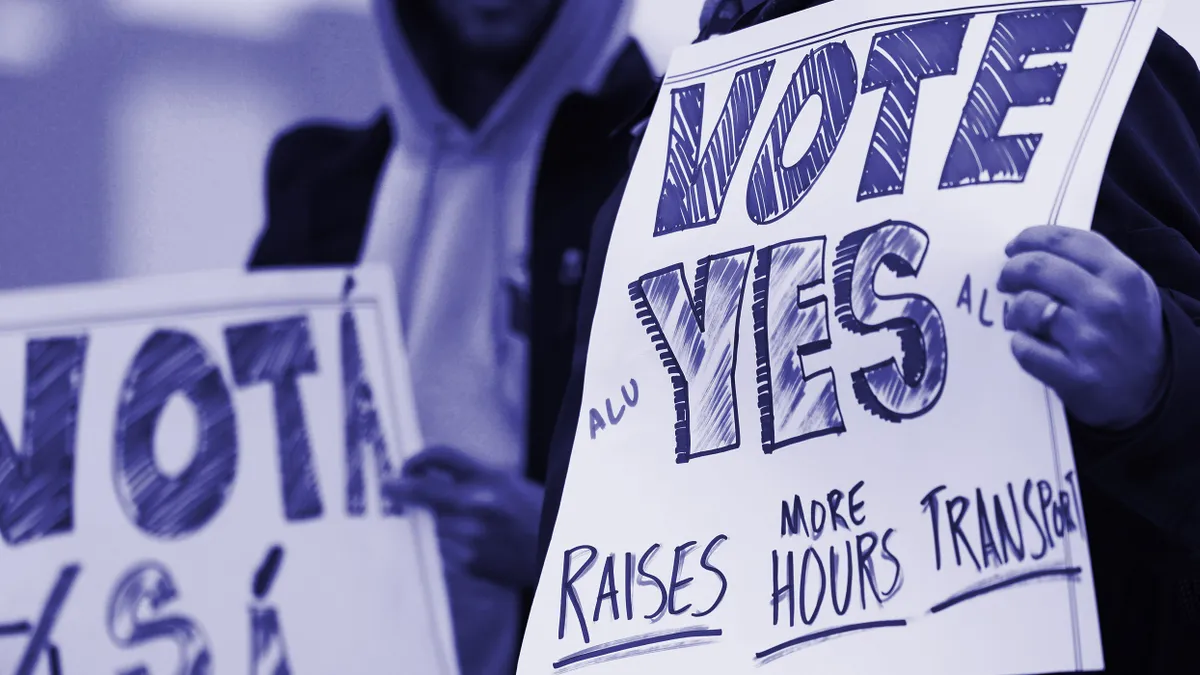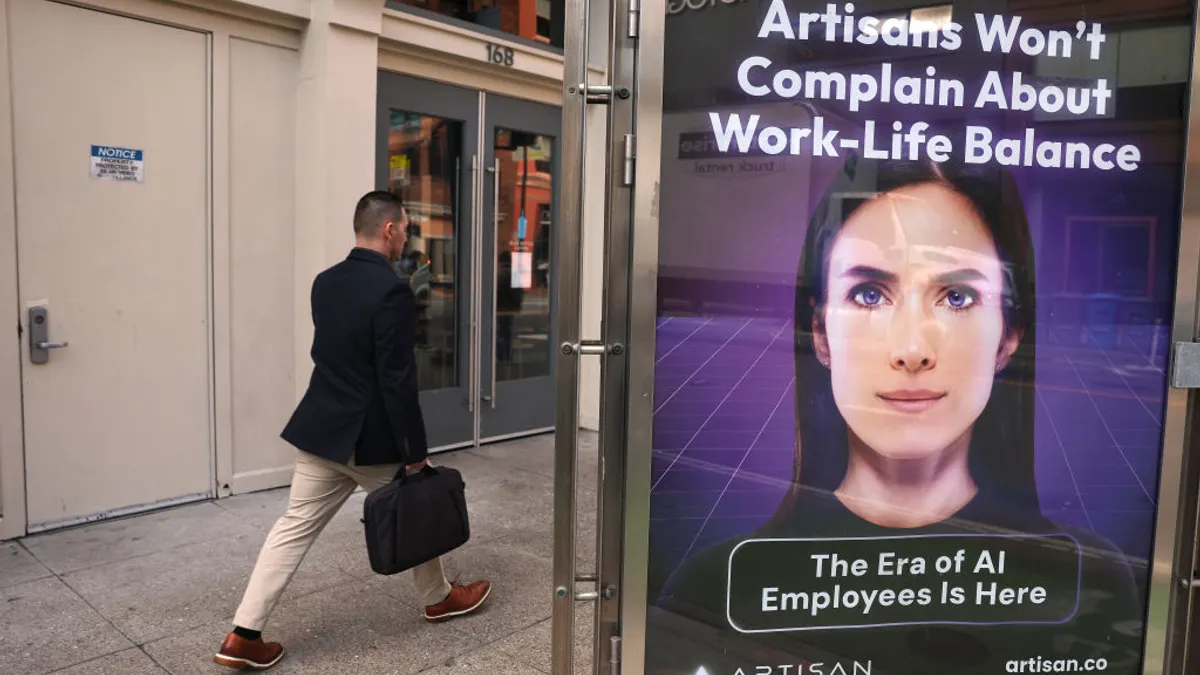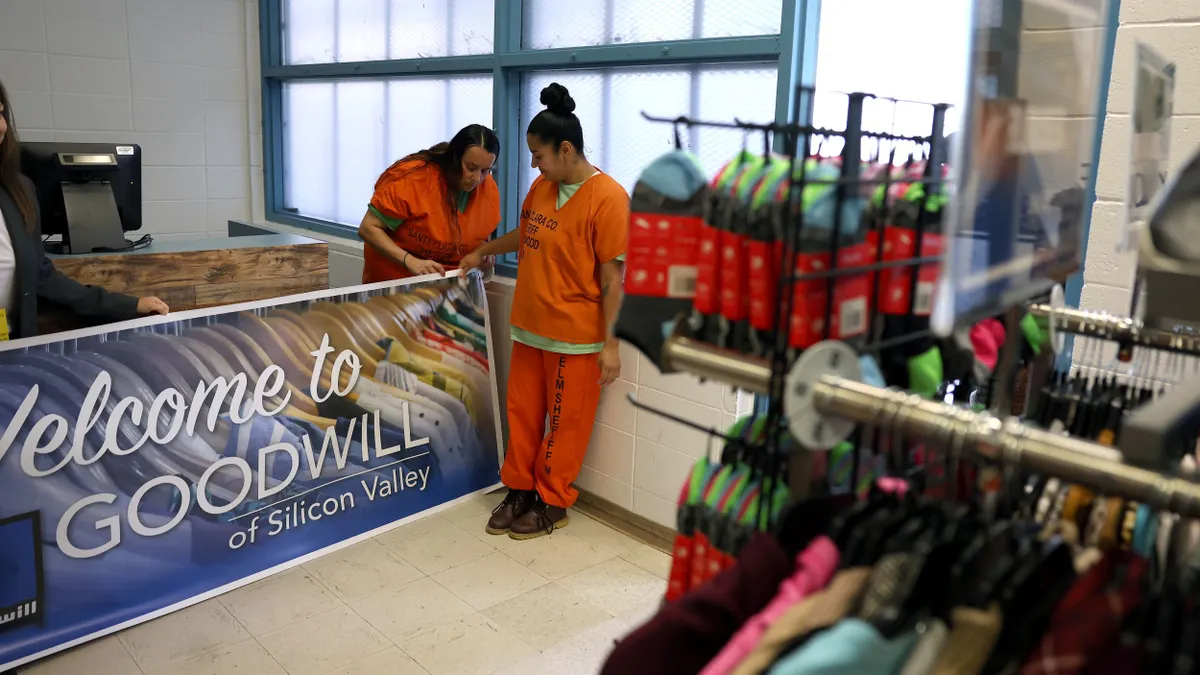Editor’s note: This article is part of a series on sustainability.
A decade ago, more than 1,100 people died when Rana Plaza, an 8-story factory in Bangledesh, collapsed. Workers, noticing cracks in the structure for weeks, begged management not to be sent inside the building, but to no avail. Once it began to fail, it took less than 90 seconds for the building to crumble.
The incident, which union leaders called a “mass industrial homicide,” illuminated issues of fair labor practices and has been the impetus of a number of changes in the retail space. Global organizations took action to create safer working standards, and workplace resolutions now often show up in retailers’ environmental, social and governance reports, which are becoming increasingly important to investors and other stakeholders.
More consumers and investors are beginning to see some retailers' policies in the U.S. as at odds with much of their ESG-based rhetoric around issues like collective bargaining, especially when their workers try to form a union, experts say. As the labor movement revives in the U.S., this contradiction is likely to become more glaring, and more companies will struggle to rationalize it, according to Alison Taylor, executive director of the Ethical Systems program at New York University's Stern School of Business.
Amazon is just one example of a company whose stated human rights principles, including support of worker collective action, clash with its own treatment of labor organizers and its delineation of unions, in investor materials, as a potential business risk. At its most recent shareholder meeting, the e-commerce giant entertained a number of proposals favorable to its hourly workers, but only after the Securities & Exchange Commission ruled that they couldn’t be left off its proxy statement.
“As we have consistently stated, our employees have the choice of whether or not to join a union. They always have,” Amazon Spokesperson Kelly Nantel said in an emailed statement. “As a company, we don’t think unions are the best answer for our employees. Our focus remains on working directly with our team to continue making Amazon a great place to work.”
Nantel didn’t immediately respond to questions about why the company explicitly states support for international labor codes that include collective bargaining if it also sees it as an impediment to the company-worker relationship or to making a workplace great.
"So much of ESG is about win-win thinking, but unions are an area where companies still think the only possible outcome is win-lose," NYU’s Taylor said by email. "This knee-jerk response is disappointing, as the right to speak up, protest and organize is a fundamental civil right, and many of these companies make human rights commitments too."
David Schilling, senior adviser at the Interfaith Center on Corporate Responsibility, sees a lot of contradiction between what many retailers say in their ESG reports and how they treat their own workers.
"Freedom of association and collective bargaining — these are basic human rights,” he said by phone. “The good news is that there's a greater recognition of the responsibilities of companies and investors to really engage in a full range of human rights."
Pro-worker rights, but anti-union?
Several major chains in the U.S. in recent years have increased their starting pay, improved benefits like health care and family leave, and provided additional opportunities for advancement or education. Economists usually view such policy changes as a consequence of market forces, like low unemployment, though retailers tend to paint them as worker-friendly.
When Target announced in February that it would set a new starting wage range of $15 to $24 at its stores, supply chain facilities and corporate offices, for example, Chief Human Resources Officer Melissa Kremer said the company wants "all team members to be better off for working at Target."
"So much of ESG is about win-win thinking, but unions are an area where companies still think the only possible outcome is win-lose."

Alison Taylor
Executive Director, Ethical Systems, NYU Stern School of Business.
"Our team is at the heart of our strategy and success, and their energy and resilience keep us at the forefront of meeting the changing needs of our guests year after year," Kremer said in a statement. "We continuously listen to our team members to understand what's most important to them, then use the feedback to make investments that meet their needs across different career and life stages."
Might a retailer so dedicated to listening to its workers support their collective action?
On paper, it appears so. Target in its ESG report endorses the International Labor Organization Core Conventions, which include the right of workers to organize and bargain collectively. “[W]e are committed to respecting human rights throughout our operations,” the company says in the report’s “Social” section.
Yet, when Target store workers in Christiansburg, Virgina moved to unionize, a company spokesperson declined to say whether the retailer supported the effort. The group, Target Workers Unite, has since withdrawn its bid to be formally recognized as a union, according to a filing with the National Labor Relations Board.
The workers’ action followed a failed request for a new policy for longtime employees still earning close to the starting wage, which is $16 at that store, according to a screenshot of their demand shared on Twitter. This falls below a living wage for a single adult without children, according to the Massachusetts Institute of Technology's living wage calculator for the Christiansburg area. Target declined to confirm the wage or elaborate on how it determines pay for a given store, and didn’t immediately respond to questions for this story about its stance on unionization at its facilities.
Retailers including Amazon and REI have been more vocal than Target about opposing unionization at their locations, saying it interferes with their relationship with their employees. Like Target, Amazon says that the International Labor Organization's Declaration on Fundamental Principles and Rights at Work informs its own approach on human rights.
Those include "freedom of association and the effective recognition of the right to collective bargaining.” Having what corporate managers deem to be good communications with workers simply doesn't rise to that level, according to ICCR’s Schilling.
"The problem with that, of course, is that there's a management team that says, 'We know what's best for our workers,'" he said. "They're not going to engage in a kind of dialogue that is really enforceable — instead it's voluntary. Well, that's not good enough."
The new labor activism
Retail workers elsewhere have persevered in pursuing union status, part of a wave that many labor experts see as "the new labor activism."
The reasons for the revival in labor activity in the U.S. are myriad, having to do not just with wages but also quality of life issues, all underscored by the pandemic, experts say. The movement is also getting more support from a National Labor Relations Board widely seen as newly empowered by the Biden administration.
While store and warehouse workers were labeled "essential" during the height of the COVID outbreak, many have been critical of the safety measures and lack of transparency at their workplaces. Now, especially with hazard pay a thing of the past at most retailers, more workers are demanding improvements in pay and working conditions. That's led to several union efforts, sometimes successfully — even at Amazon.
“Freedom of association and collective bargaining — these are basic human rights. The good news is that there’s a greater recognition of the responsibilities of companies and investors to really engage in a full range of human rights.”

David Schilling
Senior Advisor, The Interfaith Center on Corporate Responsibility
The visibility of workers' plight, their employers’ reactions and other corporate policies stand in contrast to many of the ideals espoused in ESG communications, according to NYU's Taylor.
"I certainly think you have tensions with claiming to support ESG if you are anti-unions, and if you don't pay a living wage and your fair share of tax," she said. “A truly progressive approach would allow this organization, and even follow the German model of having employees on the board."
A proposal to include hourly employees on Amazon’s board of directors received 22% of the shareholder vote in May, according to the ICCR.
There is rising shareholder interest in these issues not just out of concern for human rights, but also due to a growing sense that organized labor presents an opportunity to stabilize the business, according to Schilling. This is already true for European investors, where unions are more common and collective bargaining is routine.
“Once you get a formalized agreement with labor, it can benefit you,” he said. “You've gone through a negotiation process, so there’s fairness between the company and the workforce. In the U.S., there’s still a question of it being seen as a risk to the business, as opposed to a potential way of building in sustainability — not just of company profits, but also of the other stakeholders that are impacted, whether in its own operations or its supply chains.”
Social issues are also important to consumers, especially Gen Z, according to McKinsey’s most recent consumer pulse report. More than two thirds of younger consumers said that at least one ESG issue is important to them, even at a time, with inflation encroaching on household budgets, when value is also top of mind, according to the report.
“Paramount among their concerns is that companies are transparent and show that they care for people (employees, customers, others in their communities),” McKinsey researchers said.
Similarly, Barclays recently published a client note indicating that consumer attitudes toward ESG are becoming “truly multi-faceted.”
“Retailers need to think very hard about ESG because it is now impacting their businesses much more widely,” the firm said. “To date, the driver has very much been focused on environmental considerations but more recently it has begun to increasingly encompass the social and governance aspects. Against this backdrop it is surely far better for retailers to take the carrot option and embed ESG into their culture rather than wait to be beaten by the ESG stick and risk their future relevance.”
In other words, U.S. corporations will probably have to do more work to square their ESG goals with their internal reality, according to NYU’s Taylor.
“I'm pretty certain that the rise of the employee voice is not going away,” she said. “Companies can choose to fight this tooth and nail, or they can accept it and try to work successfully in this new world. It is just the beginning of this story.”





















